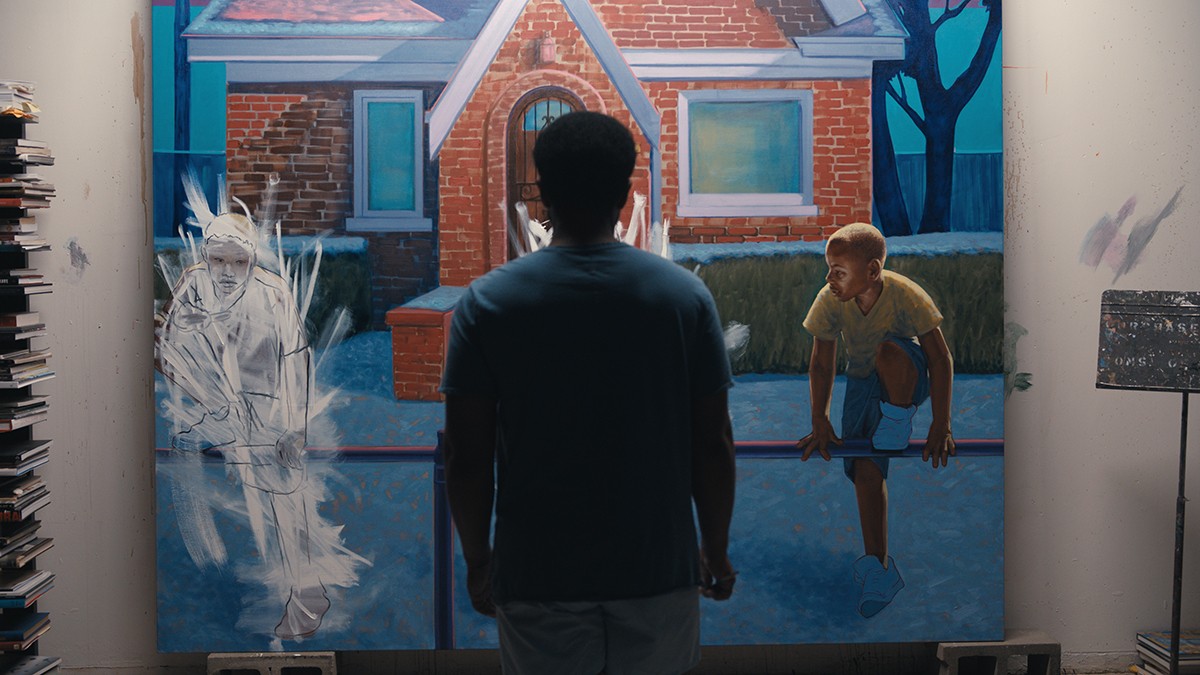I remember walking through the Wells St. Art Festival in Chicago, enjoying one of the many amazing summer festivals the city has to offer. And then I stumbled upon it: a gothic, beautiful, dark portrait of a raven, on a decaying tree, with a real rock, hung from the tree, protruding out of the painting. I had never seen anything like it, and even though I’m far from an artist, I knew I was in the presence of something so creative I had to stop and take it all in. Exhibiting Forgiveness is the movie version of that moment, taking pure art and placing it on the screen: washing over everyone for 2 beautiful hours.
Our raven here is Tarrell (Andre Holland), a well respected, gifted painter. He lives a mostly comfortable life in a beautiful home, with his talented musical wife Aisha (Andra Day), and their adorable son Jermaine (Daniel Michael Barriere). Except, Tarrell has started waking in the middle of the night with panic attacks. That’s because he’s dreading an upcoming move he’s doing for his mom Joyce (Aunjanuae Ellis Taylor), out of the childhood home he clearly doesn’t want to go back to, where his dad La’Ron’s (John Earl Jelks), um, strict parenting left permanent scars on Tarrell he carries with him.
How do we express ourselves? Exhibiting is in the title of this movie for a reason. Every person in this film has different outlets for how they emotionally deal with their lives, and this movie, tragically, beautifully, shows how those expressions cascade down to others, both good and bad. La’Ron’s frustration at how his life turned out makes him a mean, jaded cuss; his outlet was drugs, and hustling….to buy more drugs. His wife/baby mama Joyce also harbors that sadness, but her emotional manifestation is unrelenting faith and hope. All those emotional reactions young Tarrell (Ian Foreman) takes in and learns from, crafting the older man we see today. Older Tarrell’s outlet is creativity and burial. The art Tarrell produces is some of the best I’ve seen in movies (because Titus Kaphar, the writer/director, IS an artist, of course!), a visual representation of how his inner self feels. However, the art is actually keeping him from confronting his past, and dealing with the pain his parents both inflicted in their own ways on him. The conversations between Tarrell and his parents feel pulled from the real world, completely character driven and specific to these people. And yet, because of that, Titus Kaphar can also tap into generational adult discussions African Americans are having all over the United States, including the right way to parent, belief in God, male fragility, and as the 2nd word in the title says, forgiveness for past sins and moving on.
Kaphar’s talents also belong to casting, finding the perfect 4 actors to deliver everything he wants to say with Exhibiting Forgiveness. Andre Holland is always good, but this is probably the best role of his career so far. He’s the focal point of the film, incredible at being everything the script needs him to be: available, withdrawn, angry, sad, confused…anything. Even though the movie isn’t centered around the women, Aunjanuae Ellis Taylor and Andra Day’s presences are necessary for the movie to succeed. Day provides the soundtrack for the movie that will make you burst into tears, as well as showing with Holland how a successful marriage works between two complex, real adults. Meanwhile, Ellis Taylor shows she’s gonna have a long career playing lovable, complex mothers. The most underrated parts of Exhibiting Forgiveness are all the scenes between Andre Holland and Aunjanuae, filled with love but also that adult exasperation parent and child relationships feel over years of the same annoyances happening over and over again. Finally, rightfully so, John Earl Jelks is the eye popping revelation of this film. A stage star, Jelks uses that wonderful expressive face and incredible voice to bring decades of pain and frustration with himself to the role of Tarrell’s father La’Ron. Jelks and Holland are electric together, as father yearns for catharsis with the son who blames him for all of his emotional scars La’Ron knows he caused. The pair of them really make that relationship feel honest, taken from some real conversation Titus Kaphar probably had himself with his dad. By the end, like most adult life, there’s no “winner,” but there is understanding between the two of them, as manifested by the art gallery display reward the audience gets for witness the incredible emotional storytelling ringer Kaphar puts us through.
It’s a joy when a movie can pull off the artistic beauty Exhibiting Forgiveness finds, because it’s so rare. The best part about a film like this is though, when you find that creative nirvana, you just know it right away, and eagerly settle in, waiting for the next sumptuous moment. In this case too, I want that art gallery ending to go on a traveling tour all over the United States, which I’ll gladly pay to go see! Titus Kaphar, you’re a triple threat my guy!

